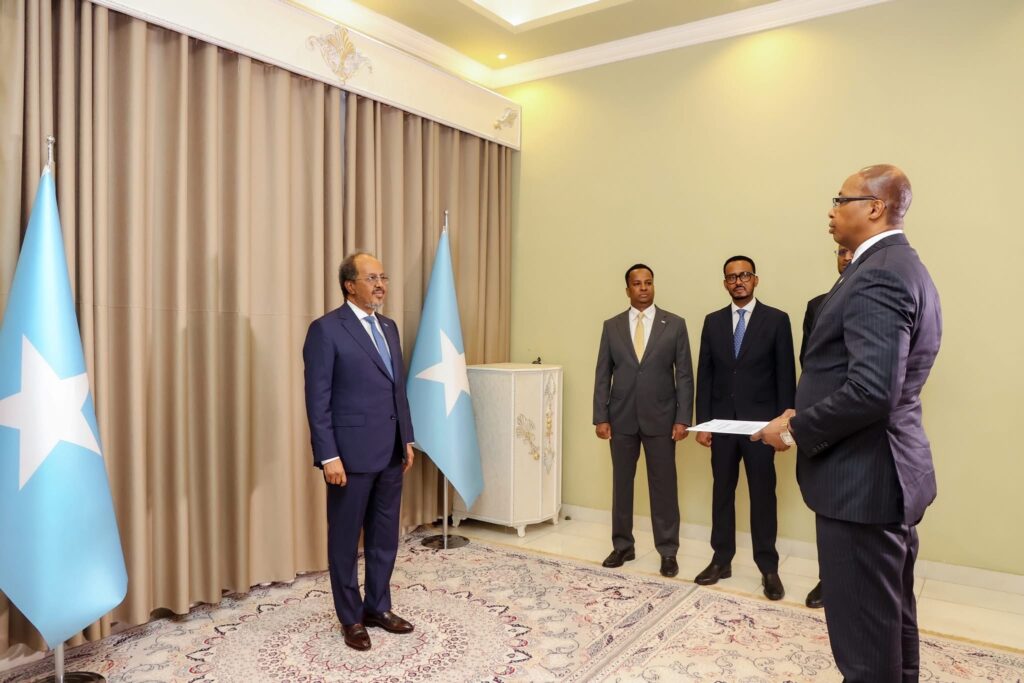The Somali government knowingly accepted a new Ethiopian ambassador with a documented history of opposing Somalia’s territorial unity, a move that is now unravelling into a full-blown diplomatic scandal, Somali Stream can confirm.
When Somalia’s President Hassan Sheikh Mohamud posed for photos with Ethiopia’s new ambassador, Suleiman Dedefo Woshe, it was more than just a diplomatic handshake. It was a quiet admission that the Federal Government of Somalia is willing to overlook blatant challenges to its sovereignty, for the right political deal.
Dedefo, whose digital footprint is filled with statements endorsing Somaliland’s secession and dismissing Somalia’s legitimacy as a unified state, was no secret agent. His views were public, prolific, and deeply unpopular in Somalia. Still, Mogadishu accepted him.
And it wasn’t a mistake.
Somali Stream has learned that both Villa Somalia and the Ministry of Foreign Affairs were fully aware of Dedefo’s past on social platform X (formerly Twitter) before signing off on his ambassadorship. Sources inside the Somali presidency confirmed that the move was part of a deliberate quid pro quo with Ethiopia: accept our man, and we’ll help you push out Jubaland’s grip on Gedo.
Long before his appointment, Dedefo was active on social media, advocating for Somaliland’s recognition and mocking Somalia’s claim to unity. For most Somali citizens, that would be enough to label someone persona non grata. For their government, it was apparently a bargaining chip.
Online backlash erupted immediately after the appointment, with Somali users calling out the administration’s deafening silence and asking how someone who so clearly defied Somalia’s sovereignty could be allowed to represent Addis Ababa in Mogadishu.
The irony cuts deep.
Ambassador Dedefo’s predecessor, Mukhtar Mohamed Waare, was expelled for far less, a few statements interpreted as disrespectful to Somalia’s territorial integrity. Dedefo, meanwhile, got a handshake and a security escort.
A-Deal-Ababa
According to diplomatic sources, Somalia’s State Minister for Foreign Affairs Ali Omar (Bal’ad) met with Ethiopian officials on the side-lines of the Food Security Summit in Addis Ababa on July 27.
That meeting sealed the arrangement: Dedefo would be accepted, and in return, Ethiopia would assist the Federal Government of Somalia in reasserting control in Gedo, a region that up until recently was under Jubaland-aligned leadership.
But just days after the ink dried on Dedefo’s credentials, Ethiopia reportedly walked back its side of the deal. Instead of helping Mogadishu, they resumed support for Madobe-led Jubaland, even hosting meetings with clan elders and reportedly preparing the return of Jubaland’s Vice President Mohamud Sayid Aden to the Gedo region.
The Districts of Balad Hawo and Doolow, previously stable, are now seeing renewed military activity, with signs of an impending escalation. Jubaland is reportedly moving forces toward El Wak and near the Kenyan Mandera border, while Ethiopia repositions itself as a power broker in the tri-border zone.
A Diplomatic Faceplant
At the heart of this scandal is a painful truth: the Somali government saw an opening to win favour with Ethiopia and took it. But it misread the room, overplayed its hand, and exposed itself to accusations of selling out its national interest.
Insiders say Ali Bal’ad was fully aware of the risks but pushed ahead, framing it as a tactical move to dislodge Jubaland from Gedo. Now, with Ethiopia’s support seemingly gone and Dedefo firmly in place, the Federal Government is left with nothing but blowback.
Officials at Villa Somalia are now blaming each other for the fallout. Some point to intelligence failures, others to political desperation. But no one is denying that this was a calculated decision, one that may have handed Addis Ababa more influence in Somalia’s internal affairs than ever before.
Somalia’s Sovereignty, For Sale?
Somalia’s foreign policy appears increasingly driven by short-term power plays and internal factional battles rather than long-term national interest.
The Dedefo scandal reveals how fragile the state’s diplomacy has become, where foreign ambassadors with anti-Somalia rhetoric can walk into high office, while the government gambles away sovereignty for fleeting political leverage.
It’s a playbook familiar to observers of foreign interference in fragile states. What’s new is how openly the game is being played and how little resistance it seems to meet at the top.


